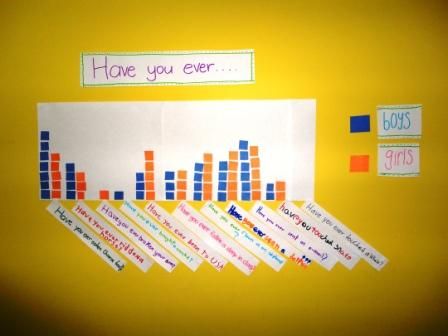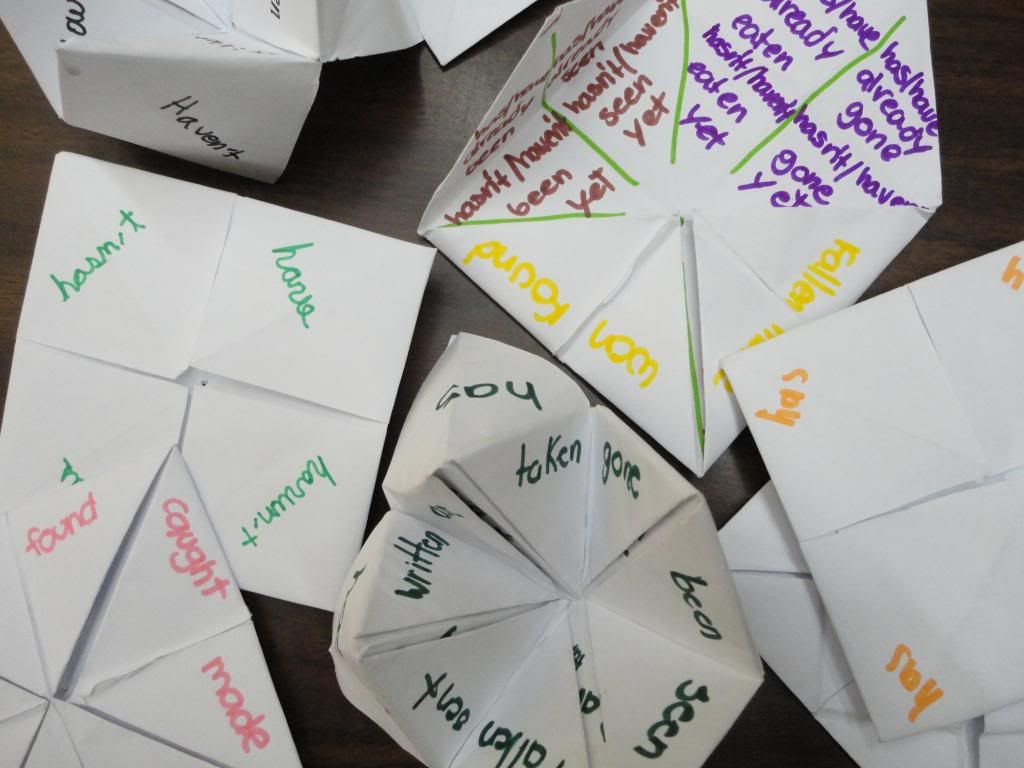Ahhh, Friday. we love you so much!
In addition to your obvious qualities, your arrival signals the beginning of weekly reflection time. Saturday, however, signals lesson planning. So let's not even think about Saturday just yet!
Anyway, as a dedication to Friday, I'm sharing some ideas for teaching the Present Perfect in English.
First, a little reminder of what the present perfect looks like:
Subject + have/has + Past Participle
And here is an example of the present perfect in use in its simplest form:
I have eaten.
She has fallen.
We don't normally speak robotically like that though! We usually add an object or a prepositional phrase, like:
I have eaten cake.
She has fallen down the stairs.
We can also add some extra words to give the reader or listener some indication of when the event happened. These words include: 'ever', 'never', 'just', 'already' and 'yet', and they all have their own position within the sentence.
Have you ever eaten cake?
I have never eaten cake.
I have just eaten cake.
I have already eaten cake. I have eaten cake already.
Have you eaten cake yet? I haven't eaten cake yet.
Firstly, 'ever' and 'never' are not opposites. 'Ever' is used in questions that indicate an infinite time in the past. 'Never' is used in statements to indicate 'not ever', meaning that an action has not occurred at any point in the past. 'Ever' is positioned after 'Have/ Has + Subject', and because the position of the Subject and Verb change in questions, 'never' is positioned after 'Subject + have/ has'.
It's important that the kids recognise that 'just' is always positioned after 'have/ has', and that it means that the action happened very recently. In Spanish, you could express this same idea by saying 'acabo de pasar'.
The word 'already' means that something has happened that you were waiting for or expecting to happen. It can appear in two places in an English sentence, but not both at the same time! You could use it after 'have/ has', or at the end of the sentence. In Spanish, you express this idea by using the word 'ya' at the beginning of a sentence.
Students must also be aware that 'yet' is used only with negative sentences and questions, and that it appears at the end of the sentence. In Spanish, you can express this by saying 'ya no' at the beginning of a negative sentence, or 'ya' at the beginning of a question. Because 'ya' is used to express both 'already' and 'yet' it is important that the students understand the difference in usage.
OK, grammar lesson over! Obviously I didn't explain it like that to the kids. Here are some of the things we did in class:
After some 'show of hands' style 'Have you ever...?' teacher prompts, and a review of irregular past participles, the kids each created their own question and went about surveying each other. They kept a record of the different answers from boys and girls. They then told me how many squares of coloured paper they needed to represent each gender, and we created this class wall chart.
Some of the questions included:
Have you ever ridden a horse? Have you ever seen a dolphin? Have you ever fallen asleep in class?
This activity also gave me a chance to reinforce 'never', by narrating findings such as 'The girls have never bought a snake'. They repeated my observations chorally to practice the structure :-)
I've already blogged about this next display, so sorry for the repeat :-p
I made a list of all of our focus words in the past participle form and attached them to the wall with Tac. In addition to providing the students with a visual cue during class discussions, I can get them to stand up and move words around (like placing 'already' and 'yet' at the end of the sentence.) We can also remove them and use them to create sentences on the whiteboard.
Then we made Cooty Catchers to reinforce the difference between 'yet' and 'already' and their positions in a sentence. On the outside we wrote 'have', 'has', 'haven't' and 'hasn't'.
To play, the kids had to choose one of these words, which the Cooty Catcher Operator would spell out. The choice of affirmative or negative also dictated whether the kids had to form a sentence with 'already' or 'yet'. Then the kids had to choose a past participle. Then they invented sentences.
Inside the Cooty Catcher were the two possible word orders for the sentences, e.g.
have/ has + already + Past Participle
haven't/ hasn't + Past Participle + yet
Enough grammar! I love it but I know it's not a favourite for everyone :-D
Now for the giveaways!
Ash from Pixy Stix and Teacher Tricks is celebrating 100 followers with a big fat giveaway! There are 13 prizes including $15 of graphics from Mel at Frogspot From the Pond. I LOVE her graphics! AND she's an Aussie which makes her even better :-P
Latoya at Flying into First is having a 200 follower giveaway... I swear she just had a 100 follower giveaway only a few days ago?! Clearly, she has an awesome blog which you need to check out if you haven't already. She is doing her giveaway in 2 parts (because it is SO BIG!)
Stephanie is a new blogger like me. Her blog is called Sparkling in Third Grade. She is giving away a bunch of her TpT products plus a $25 Nordstrom gift card to celebrate her entry into the blogging world. How sweet is she?? I love her already.
Krista from Stellar Students is having a giant Spooktacular giveaway. Seriously, it is huge. In addition to TpT goodies, she is also giving away a $25 Ebay gift card, and a super cute Thirty One bag full of Philosophy skincare. You need to hurry with this one though as it ends at midnight on Sunday!
Buena suerte como siempre!
As always, good luck!
As always, good luck!








.png)

Kirra, you are right- grammar can be so tricky to teach and not always very interesting. I like how you incorporated the graphing idea, so clever! I did have a bit of a giggle at your "cooty catchers", we call them chatterboxes. I use them for spelling as well.
ReplyDeleteTania
Mrs Poultney's Ponderings
I forgot what we call them in Australia :-o Thank you for reminding me Tania! I swear am becoming more Americanised the longer I live in Mexico.
ReplyDeleteHere in Mexico they call them 'adivinadoras' (fortune tellers). This is the first time I have used them here but the kids love them; I will have to adapt the idea for other classes I think!
Great Post on giveaways I will have to check them out. I'm having a giveaway right now on my blog too if you would like to check it out!
ReplyDeleteஐRikki
The Hive